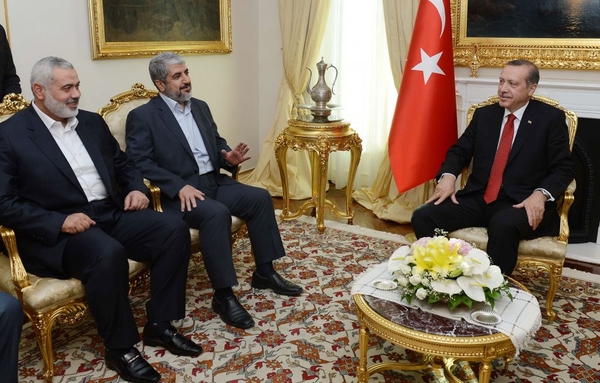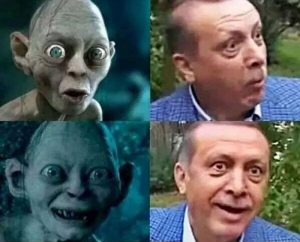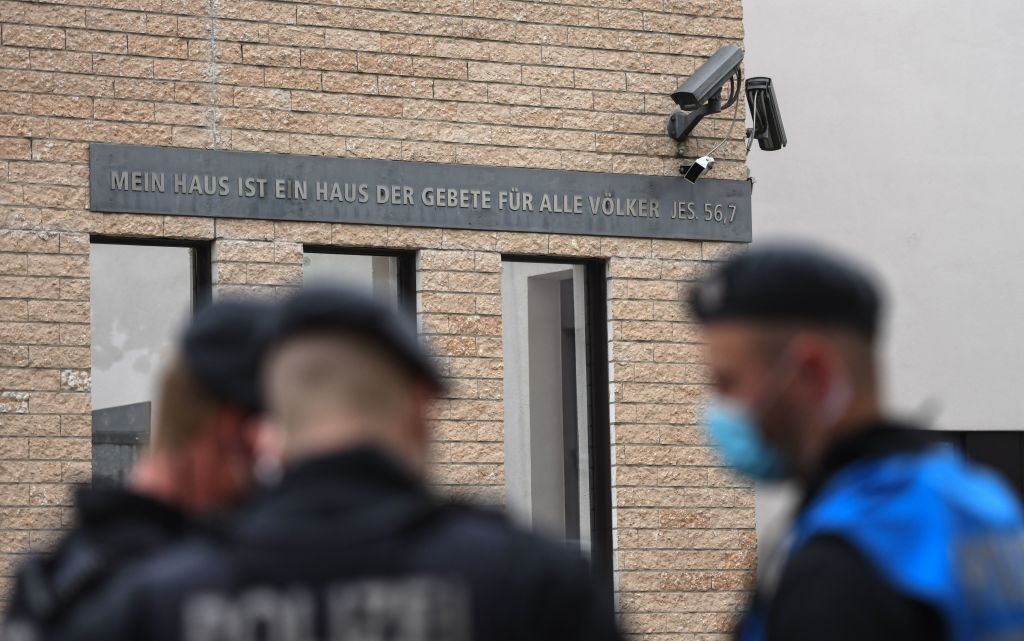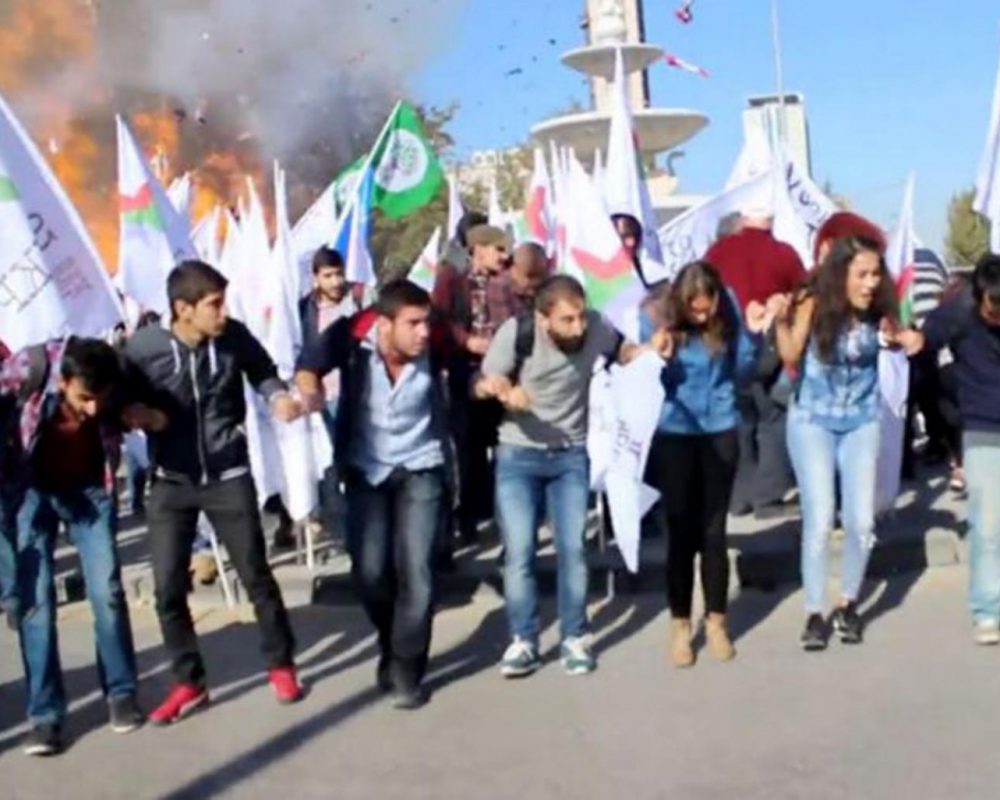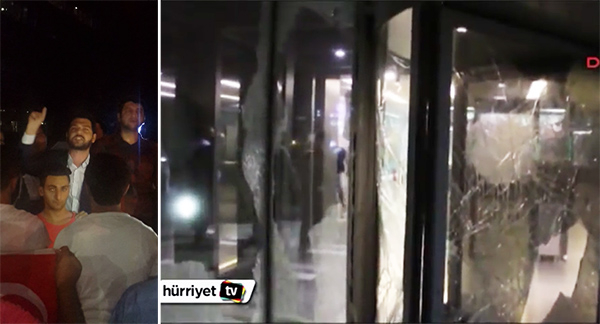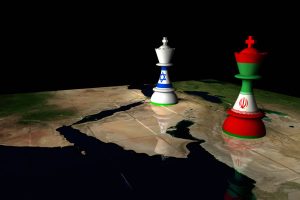Ever since clashes between the Turkish army and the Kurdish PKK (Kurdistan Workers’ Party) intensified in late July, the pressure of the government against the Kurdish media, including bans on Kurdish news outlets as well as psychical violence against journalists, have become increasingly widespread.
On October 4, for instance, Turkish police in the Kurdish province of Diyarbakir detained two Kurdish journalists: Murat Demir of Ozgur Gun TV (Free Day TV) and Serhat Yuce of Dicle News Agency. The police seized their cameras and equipment. A police officer put a gun to Yuce’s head and took both into custody. The journalists were released after five hours, but fined for “violating the curfew” imposed on the town.
On October 6, Turkish police abducted Filiz Zeyrek, a female journalist working for the Kurdish JINHA (Women’s News Agency), in the southern province of Adana and drove her around for half an hour while interrogating and photographing her. The police then released her at a park.
Earlier, on September 28, Turkish police armed with assault rifles raided the offices of the Dicle News Agency (DIHA), the newspaper Azadiya Welat (Freedom of the Country), Aram Publishing House and the Kurdi-Der (Kurdish Language Association) in Diyarbakir, andarrested 32 journalists. The police seized their ID cards and phones, and eventually took the journalists to police headquarters. One of the reporters, Dicle Muftuoglu, said the police broke down the door, did not show a search warrant and did not allow the journalists to call their lawyers. The journalists were released late at night.
In the meantime, since late July, more than 100 pro-Kurdish websites have been totally blocked— including Dicle News Agency, Ozgur Gundem newspaper, Firat News Agency, Hawar News Agency and RojNews.
This month, the website of another Kurdish news agency, JINHA (Women’s News Agency), which focuses on women’s rights issues in Kurdistan and the Middle East, has also beenblocked by Turkey’s Presidency of Telecommunication (TIB).
Turkish authorities claim that most of the sites have been banned because “they are close to the PKK or support terror acts,” according to the newspaper Hurriyet.
“Security institutions make demands. And action is taken according to these demands. … The bans start at the direction of the security institutions. These institutions report the sites they have chosen to the Presidency of Telecommunication (TIB). First, a decision of administrative closure of those sites is made; then, in 24 hours, the decision is presented to the court for its approval.”
The authorities say that, “the security institutions specify the sites used by terror organizations and the sites that praise or propagate terror acts. Then based upon this specification, the administrative process gets started.”
Last month, the Radio and Television Supreme Council (RTUK) ceased broadcasting all of the TV channels on Digi Medya 1 and 2, as well as Guc Medya 1 and 2 satellite providers.
Fourteen of these are pro-Kurdish TV channels – including Ozgur Gun TV (Free Day TV.)
RTUK claims that it has ceased broadcasting the channels because “they have not complied with the right of publication.” However, the editors of some of the blocked Kurdish sites told Gatestone Institute that they do not agree with the excuses of the state authorities.
Faysal Dagli, chief editor of BasNews, said:
“The banned outlets are either Kurdish language sites that have ties with Kurdistan, or that are dissident, and might cover incidents the government does not want the public to hear about. In this current phase, when a cycle of violence has been restarted, these kinds of operations by the state are a familiar method of dimming facts that refer to the state. The government controls such phases through its own media. What matters to them is to restrict the influence of the dissident or ‘uncontrollable media’ at times when unexpected events are taking place, or else to prevent news from coming out of Kurdistan. The Turkish army’srecent bombardment of the Kurdish village of Zargala in Qandil reveals this purpose.”[1]
Ramazan Pekgoz, editor of Dicle News Agency, said:
“Since July 24, our four web addresses have been blocked. When we expose what is really going on, we are subjected to attacks and censorship. Before the ban, we covered an incident in which Kurdish workers were tortured by a Turkish police officer in Yuksekova. In 2011, our reporters were the first to cover the Roboski massacre. We also covered the Kurdish extrajudicial murders and massacres in 1990s. But every time the war in the region intensifies, they ban us…This has been the state mentality for years. In 1990s, they murdered our colleagues. They bombed our offices, and closed down the papers that worked with us. Today, they block our web content. We expose their war crimes; and they respond by blocking us.”
Erkan Capraz, chief editor of Yuksekova News, said:
“Whatever happens in Kurdish cities, we report them in accordance with journalistic ethics. So we are shocked that we are faced with such a censorship. We already knew that journalists in Turkey are not free and there are restrictions to the freedom of expression. We have been brought to court several times. We somewhat understand these trials and investigations. Sometimes a prosecutor or a citizen is disturbed by some news reports and makes a complaint about that outlet and an investigation is opened against the reporter or the editor. But before that ban, there have been no complaints or complainants against us. The Turkish prime ministry has sent a list to the Presidency of Telecommunication (TIB) based on an intelligence report and wanted it to close down the websites in that list. I do not think there could be such a practice in any country other than Iran.
“But it is so wrong to deprive our hundreds of thousands readers from our outlet. This is a disgrace to the freedom of expression and of the press. Our readers ask us why we have been blocked. There is only one explanation we can make to them: ‘We have exposed the truth.’ Turkey is committing a huge crime by blocking our outlet now. We will continue our legal struggle. If necessary, we will take the case to the European Court of Human Rights. This lawlessness should be exposed to the entire world.”
The ban on the Yuksekova News website was removed on October 20 — after 87 days.
Mehmet Oguz, chief editor of the Turkish page of Rudaw, noted:
“In recent weeks, there have been new events in Turkey such as the war between the PKK and the Turkish army and Turkey’s participation in the global coalition against ISIS. And after these developments, house raids and arrests of Kurds are on the rise. What attracts my attention is that the ‘new Turkey’ (the term Erdogan uses to define Turkey under his rule) is acting with its old reflexes. In times of crises, censorship is the first thing they think of. They did so in 1990s as well.
“The Turkish mainstream media outlets use the same language against Kurds and have taken the stance of a Turkish ‘commando’…
“As the Kurdish media has been banned, all these incidents make us ask: Is there something that is going on secretly?”
Apparently, pressures, prohibitions against media and even murders of journalists have been a state tradition.
The Platform of Solidarity with Arrested Journalists (TGDP) reported that in 103 years in Turkey, 112 journalists and writers have been murdered. The TGDP notes that most of the murdered journalists were Armenians or Kurds.
The Armenian journalists were massacred mostly during the 1915 Armenian Genocide; Kurdish journalists were massacred mostly between 1990 and 1994. (See the list of TGDP.)
Armenian intellectuals — including journalists, editors, writers or publicists — were also slain during the deportation campaign of the Armenian Genocide. On April 24, 1915, they were arrested in Constantinople (Istanbul). Some of them died on the way to their exile, others died after reaching it.
The last Armenian journalist murdered in Turkey was Hrant Dink, known for his advocacy of human rights and minority rights in Turkey. As editor-in-chief of the bilingual Turkish-Armenian newspaper Agos, Dink had written and spoken about the Armenian Genocide and had been under prosecution for violating Article 301 of the Turkish Penal Code — making it illegal to insult Turkey or Turkish government institutions — and “denigrating Turkishness.” Dink was shot dead outside his newspaper’s office in Istanbul on January 19, 2007.
One of the main targets of the Turkish state has been Ozgur Gundem, particularly known for its extensive coverage of Kurdish matters and the conflicts between the Turkish army and the Kurdish PKK (Kurdistan Workers’ Party).
Since Ozgur Gundem was founded on May 30, 1992, “authorities led a concerted campaign of arrests, bans and trials against Ozgur Gundem, eventually forcing the paper to close in April 1994,” according to the Committee to Protect Journalists. “In addition to the legal harassment, journalists at the paper were frequent targets of violent reprisal by unidentified assailants.”
During that period, Turkey held more journalists in prison than any other country. In 1992, 14 journalists and two newspaper distributors were murdered.
And in 1993, nine journalists and 13 distributors were murdered.
In 1994, seven journalists and two distributors were murdered.
Of Ozgur Gundem‘s 580 issues, criminal cases were opened in relation to 486 of them, and its editors in chief were sentenced to a total of 147 years in prison.
Ocak Isik Yurtcu, one of the former editors-in-chief of the paper, became the symbol of the pressures against the Kurdish press. The sentence against Yurtcu amounted to 15 years’ imprisonment.
While serving his sentence in prison, Yurtcu said in an interview:
“My problem is not unique. … What I’m going through can face all journalists out there. They can use laws to put you in prison just for mentioning the word ‘PKK’ in your news story. They take this as ‘praising the terrorist organization.’ How can you write about the Southeast without mentioning the PKK?”
After Ozgur Gundem was banned, the paper often changed its name in order to be able to continue the publication, but courts kept on issuing bans on publishing papers that followed the same line as Ozgur Gundem.
The successors of Ozgur Gundem were also victims of attacks: On 3 December 3, 1994, three bombs hit the printing facilities of Ozgur Ulke, one of the successors of the paper, and its offices in Istanbul and Ankara. One member of staff was killed and 23 injured.
Today, the website of Ozgur Gundem has been blocked in Turkey.
Eren Keskin, one of the chief editors of Ozgur Gundem and a human rights lawyer, told Gatestone Institute:
“I oppose it when these pressures against the Kurdish media are [depicted as being] restricted to the rule of Tayyip Erdogan. This did not start with Erdogan or the AKP. Ever since the Turkish Republic was established, the Kurdish media has been under pressure. I was the lawyer of Ozgur Gundem for years. So these unjust practices should not be evaluated by just looking at what is happening today. The state ideology towards the Kurdish people, Kurdish political movement and Kurdish media has never changed. And these bans take place because the state does not want the incidents in Kurdistan to be exposed. This has been the state policy for decades; it is nothing new.”

Abdurrahim Boynukalin (center of left image), a Turkish Member of Parliament from the ruling AKP Party, leads a mob in front of the offices of Hurriyet newspaper, September 6, 2015. At right, the shattered windows of the building’s lobby, after the mob hurled stones.
|
Ever since the Turkish state was founded in 1923, Turkey has never had freedom of the press.
The first government ruled by the Republican People’s Party (CHP) — through its Law on the Maintenance of Order enacted in 1925 and the Press Law in 1931 — closed down or censored many newspapers with various political inclinations, arrested many journalists and banned many foreign newspapers and magazines from entering Turkey. The Law on the Maintenance of Order gave the government the “right” to close down newspapers.
The minister of interior then, Sukru Kaya, described the “press policy” of the government: “The press is to comply with the political regime of the place where it is based. Just as every regime seeks for a type of citizen suitable for itself; it also seeks for a type of press suitable for itself.”
During the rule of Mustafa Kemal Ataturk, Turkey’s first president, at least 130 newspapers, magazines and books were banned. During the rule of Prime Minister Adnan Menderes (1950-1960, from the Democrat Party), 161 were banned.[2]
“It is not enough to say that there was no freedom of the press in that [one-party] era,” wrote the historian, Professor Mete Tuncay. “In the Ottoman autocracy, too, the press was not able to write what the government did not want. In the one party era [during the CHP administration of republican Turkey], however, the press could write only what the government wanted it to write.”[3]
The Greek-language media has also become almost extinct in Turkey.
During the government-instigated attacks against the Greek Christians of Istanbul in 1955, Muslim Turks in the city attacked everything owned by Greeks — their homes, offices, businesses, cemeteries, churches, and schools, among other things. And the Greek-language press of Istanbul was no exception.
“The offices and printing presses of eight newspapers were destroyed,” wrote the author Speros Vryonis Jr. “All three principal dailies, the Apoyevmatini, the Tachydromos, and theEmbros suffered heavy losses. The first two had both their offices and printing establishments completely wrecked. In the case of the Embros only its offices were destroyed since it had no printing press of its own.”
Due to many aggressive and discriminatory state policies against Greek Christians — including the 1955 attacks and the 1964 expulsions of Greeks from Turkey, the Greek population of Istanbul and Anatolia has dropped tremendously.
Today, Apoyevmatini, Turkey’s only Greek-language newspaper, faces closure. Mihail Vasiliadis, its editor-in-chief, said there were about 120,000 Greeks in Istanbul during the 1930s and 1940s, at which time the newspaper had a circulation of 35,000. But today, there are only 605 Greek families in the city, and 600 of those are Apoyevmatini subscribers. The offices of the paper, which was established in 1925, were closed down in October 2014 due to economic difficulties. Ever since, Vasiliadis has been trying to put the paper together from his home. Vasiliadis explained that he has had difficulty even covering rent payments.
For decades, it seems that Turkish state authorities have tried to silence all dissident voices in the media — particularly Kurdish, Greek and Armenian journalists. One cannot help asking: Why does Turkey try so hard to destroy free speech? What is it that all those Turkish governments have been trying to hide?
Uzay Bulut, is a Turkish journalist, born and raised a Muslim, and based in Ankara.













